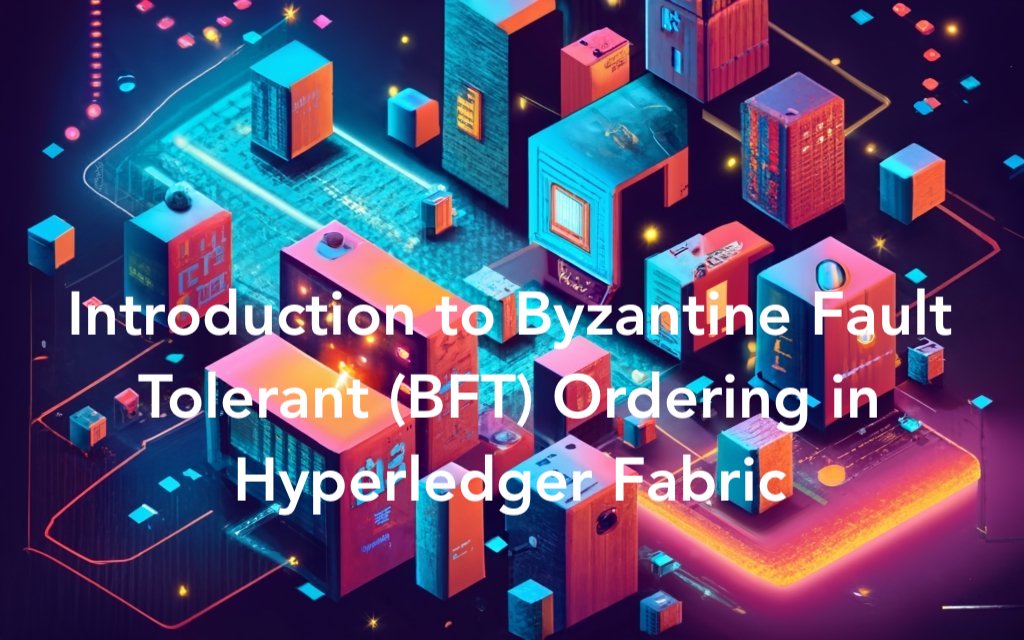Welcome to this blog series on Byzantine Fault Tolerant (BFT) Ordering in Hyperledger Fabric. In this first blog of the series, we will introduce the concept of BFT ordering and its significance in distributed systems. We will explain the limitations of Crash Fault Tolerant (CFT) ordering and the need for BFT ordering in Hyperledger Fabric. Furthermore, we will explore the benefits of BFT ordering in ensuring trust and decentralization in a permissioned blockchain network. Join us as we delve into the world of BFT ordering and its role in the Hyperledger Fabric framework.
In the world of distributed systems and blockchain technology, the term “Byzantine Fault Tolerance” (BFT) is often mentioned when discussing the resilience and security of a network. BFT refers to the ability of a system to continue functioning and reach consensus even in the presence of malicious or faulty nodes. This concept is extremely important in permissioned blockchain networks like Hyperledger Fabric, where trust and decentralization are key factors.
In a distributed system, nodes communicate and cooperate to achieve a common goal, such as reaching consensus on the order of transactions. However, the presence of malicious nodes that might behave in unexpected ways can disrupt the consensus process, leading to inconsistencies and potential vulnerabilities in the system. Byzantine Fault Tolerance provides a solution to these challenges by allowing the network to withstand such malicious behavior.
Hyperledger Fabric, an open-source permissioned blockchain framework, has been utilizing a Crash Fault Tolerant (CFT) ordering service since its early versions. While CFT ordering can handle occasional crash failures, it is not designed to withstand the actions of malicious nodes. This limitation creates a need for Byzantine Fault Tolerant (BFT) ordering in Hyperledger Fabric.
BFT ordering service offers an enhanced level of resilience by not only tolerating crash failures but also withstanding a subset of nodes that may behave maliciously. It ensures the trust and decentralization of the network by enabling the participation of multiple parties, where up to and not including a third of the orderers may be compromised or have malicious intent.
The importance of BFT ordering becomes apparent when we consider the security and integrity requirements of permissioned blockchain networks. In domains such as finance, supply chain, and healthcare, where sensitive data and critical transactions are involved, maintaining trust and ensuring decentralization are of utmost importance.
Byzantine Fault Tolerance offers several benefits in the context of Hyperledger Fabric:
- Trust: BFT ordering service enables the network participants to have confidence in the integrity of the transactions. It ensures that even if a subset of nodes is compromised or malicious, the overall consensus process remains secure.
- Decentralization: BFT ordering promotes true decentralization by allowing multiple parties to participate in the consensus process. The network does not rely on a central authority, reducing the dependency on a single point of failure.
- Resilience: BFT ordering service enhances the robustness of the network by withstanding a significant number of malicious nodes. It ensures that the network can continue to operate and reach consensus even when faced with attempts to disrupt the system.
- Enhanced Security: With BFT ordering, the network becomes more resistant to attacks aimed at manipulating or tampering with the transaction order. The consensus process provides a higher level of assurance and protection against malicious activities.
In summary, BFT ordering in Hyperledger Fabric is a crucial aspect of achieving a trustworthy and decentralized blockchain network. It offers resilience against malicious nodes and ensures the integrity of transactions. By leveraging BFT ordering, organizations can deploy secure and reliable permissioned blockchains, enabling various real-world use cases that require high levels of trust and security.
As the blockchain industry evolves, the adoption of Byzantine Fault Tolerant ordering mechanisms becomes increasingly important to ensure the reliability and resilience of distributed systems. Hyperledger Fabric’s integration of BFT ordering service in version 3.0 is a significant step forward in building robust and secure blockchain networks.









